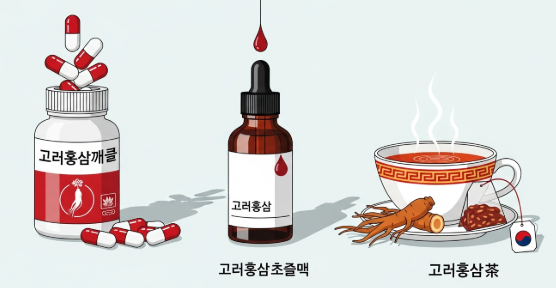Imagine Sarah, a 45-year-old professional. She’s heard about the benefits of Korean Red Ginseng — boosting energy, supporting immunity, and promoting mental clarity — but when she walks into a wellness shop, she sees capsules, liquid extracts, and tea. Which one should she choose?
Choosing the right ginseng form is crucial for getting consistent benefits, maintaining convenience, and aligning with your lifestyle. This article dives into the differences between capsules, extracts, and tea, helping you make an informed decision based on research-backed evidence and traditional use, following EEAT principles and Google Health guidelines.
Understanding Ginseng: Why Form Matters
Korean Red Ginseng (Panax ginseng) contains active compounds called ginsenosides, responsible for many of its health-supporting effects:
- Energy and stamina
- Immune resilience
- Cognitive support
- Anti-inflammatory and antioxidant activity
How these compounds are absorbed and utilized by the body can differ depending on the form of ginseng you choose.
1. Ginseng Capsules: Convenience Meets Standardization
What They Are
Capsules usually contain powdered ginseng root or standardized extracts, ensuring a known concentration of ginsenosides.
Benefits
- Precise dosing: Each capsule contains a measured amount of active compounds.
- Convenience: Easy to take daily, ideal for busy lifestyles.
- Long shelf life: Typically more stable than liquid forms.
Considerations
- Less flexible in dosage adjustment
- No ritualistic or sensory experience like tea
- Some capsules may contain fillers; choose high-quality brands
Best For
- Professionals with tight schedules
- Travelers
- Anyone who wants consistent, standardized intake
2. Ginseng Extracts: Potent, Fast-Absorbing, and Versatile
What They Are
Liquid extracts or tinctures concentrate ginsenosides in a small volume. These are often taken by dropper or mixed in water.
Benefits
- Rapid absorption: Liquid form may be absorbed more quickly.
- High potency: Often contains a higher concentration of ginsenosides per serving.
- Flexible dosing: Easy to adjust according to individual needs.
Considerations
- Taste can be bitter; not everyone enjoys it
- Requires careful measurement
- May have shorter shelf life than capsules if not stored properly
Best For
- People seeking fast-acting support
- Those recovering from fatigue or needing extra energy
- Individuals who prefer liquids over swallowing pills
3. Ginseng Tea: Traditional, Ritualistic, and Gentle
What It Is
Tea is made by steeping ginseng root slices in hot water. This is the traditional method of consumption in Korea and other parts of Asia.
Benefits
- Enjoyable experience: Warm beverage, calming ritual
- Gentle absorption: Slower release of compounds, supporting steady effects
- Hydration bonus: Drinking tea contributes to daily water intake
Considerations
- Variable potency: Ginsenoside content can vary based on root quality and steeping time
- Less convenient: Not ideal for on-the-go lifestyles
- Longer preparation: Requires planning and time
Best For
- Individuals who enjoy ritualistic wellness practices
- People seeking gentle, daily support
- Those who prefer natural, whole-root forms
Comparing Bioavailability and Effectiveness
Capsules
- Standardized ginsenoside content
- Predictable absorption
- Ideal for clinical or consistent supplementation
Extracts
- Higher bioavailability in some studies
- Rapid effect on energy and immunity
- Flexibility in dosage
Tea
- Gentle and steady absorption
- Cultural and sensory benefits
- Less standardized, requires higher quantity for equivalent potency
Tips for Choosing the Right Form
- Identify Your Goal
- Energy boost → extract or capsule
- Relaxation and wellness ritual → tea
- Immune support → capsule or standardized extract
- Consider Lifestyle
- Busy and on-the-go → capsule
- Flexible at home → tea or extract
- Check Quality
- Look for authentic Korean Red Ginseng
- Standardized ginsenoside content
- Trusted suppliers to avoid fillers or adulteration
- Consistency Matters
- Benefits accumulate with regular intake
- Pair with balanced diet, hydration, and moderate activity
Combining Forms for Maximum Benefit
Some people combine capsules in the morning for convenient energy and tea in the evening for a relaxing ritual. This hybrid approach can provide both standardized potency and daily wellness enjoyment.
Safety Considerations
- Generally safe for healthy adults
- Mild side effects may include insomnia, digestive discomfort, or mild headaches in sensitive individuals
- Avoid combining with certain medications (anticoagulants, stimulants) without consulting a healthcare professional
- Pregnant or breastfeeding individuals should seek professional guidance
Conclusion
Choosing the right ginseng form depends on your goals, lifestyle, and personal preference:
- Capsules: Convenience, standardization, consistent dosing
- Extracts: Potent, fast-absorbing, flexible
- Tea: Traditional, gentle, ritualistic, and enjoyable
High-quality Korean Red Ginseng—especially 6-year-old roots—ensures maximum benefits regardless of form. By selecting the right type and maintaining consistent intake, you can support energy, immune function, mental clarity, and overall wellness naturally.







